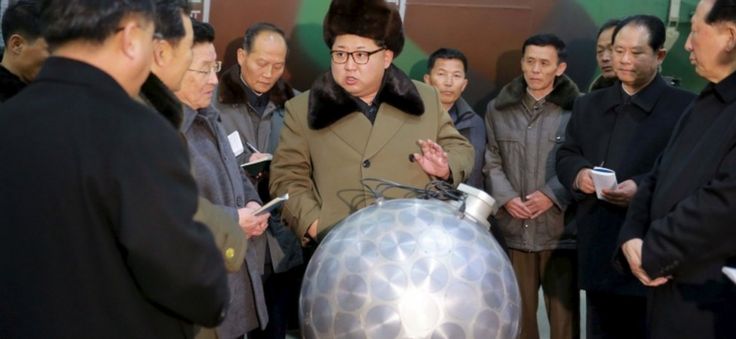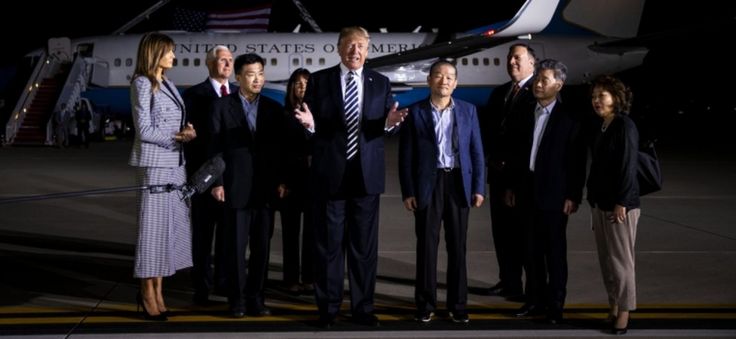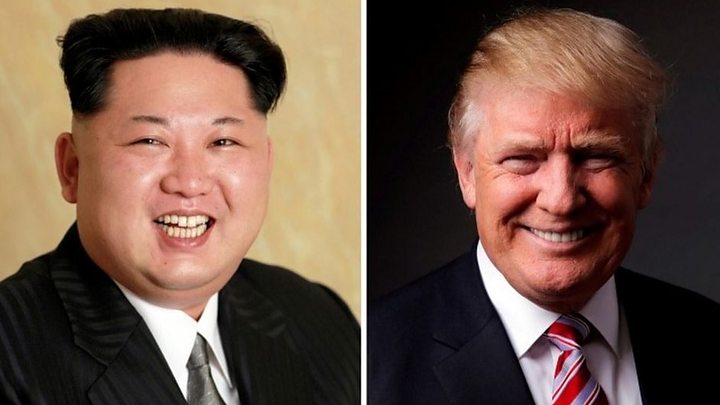
This article is more than
7 year oldThe highly anticipated meeting between Mr Trump and North Korea's Kim Jong-un is due to take place on 12 June.
But in an angry statement, North Korea's vice-foreign minister accused the US of making reckless statements and of harbouring sinister intentions.
He pointed the finger squarely at US National Security Adviser John Bolton.
"We do not hide our feeling of repugnance towards him," Kim Kye-gwan said.
The White House has responded by saying it is still hopeful the meeting will go ahead.
"The president is ready if the meeting takes place. If it doesn't, we'll continue the maximum pressure campaign that's been ongoing," said spokesperson Sarah Sanders.
The groundbreaking agreement for Mr Kim and Mr Trump to meet came about as North Korea said it was committed to denuclearising the Korean peninsula.
Exactly what that would entail has remained unclear, but North Korea has invited foreign media to witness the dismantling of its main nuclear test site later this month.
Mr Bolton recently said North Korea could follow a "Libya model" of verifiable denuclearisation, but this alarms Pyongyang, which watched Libya's Colonel Gaddafi give up his nuclear programme only for him to be killed by Western-backed rebels a few years later.
The BBC's Laura Bicker in Seoul says North Korea - which had long said its nuclear arsenal is essential for its survival as a state - is now making its demands clear.
Laura Bicker, BBC News, Seoul

The whole reason it has spent years building up a nuclear arsenal, at such a great cost, is for survival.
So to compare denuclearisation in North Korea with Libya or indeed Iraq as John Bolton did on Sunday is not going to offer much comfort. Both regimes collapsed.
This is also a warning shot to the Trump administration. They will be aware how much Mr Trump wants this summit and how it is being spun as a success brought about by his maximum pressure strategy.
There were signs this boasting irritated Pyongyang, but now it has decided to speak out through someone in a position of power.

North Korea wants the world to know that it is coming to the negotiating table from a position of strength, and they may feel that they are making all the concessions.
They've suspended all missile tests, released the three US detainees, Kim Jong-un met President Moon and the pair signed a declaration, and they're about to dismantle a nuclear test site in front of international media.
So to hear the Trump administration claiming credit for a deal they don't like has been a step too far.
These statements more than hint that North Korea is prepared to walk away from President Trump's summit in Singapore until it does hear a deal it does like.
Mr Kim's statement, carried by state media, said that if the US "corners us and unilaterally demands we give up nuclear weapons we will no longer have an interest in talks" and "will have to reconsider" attending the 12 June summit in Singapore.
He said North Korea did have "high hopes" but that it was "very unfortunate that the US is provoking us ahead of the summit by spitting out ludicrous statements".
Kim Kye-gwan is known to be highly respected in the North Korean leadership and has taken part in negotiations with the US before. There is very little chance his comments were not personally endorsed by Kim Jong-un.
Hours before the announcement, in a sign of growing problems, North Korea had also pulled out of a meeting scheduled with South Korea on Wednesday.because of anger over the start of US-South Korea joint military drills.
North Korea had earlier said it would allow them to go ahead, but then called them "a provocative military ruckus" which was undermining its diplomatic efforts.

The sudden change in tone from Pyongyang is said to have taken US officials by surprise. Analysts said North Korea could be trying to strengthen its hand before talks.
The US state department said it was continuing to plan the Trump-Kim meeting, and Mr Trump is yet to comment.
A Chinese government spokesman urged North Korea and the US to "meet each other halfway" ahead of negotiations.
The hawkish conservative is a firm defender of US power and a confrontational advocate for wielding that strength abroad. He has previously said it would be "perfectly legitimate" to carry out a pre-emptive strike on North Korea.
In media interviews over the weekend, he said North Korea could follow a Libyan model of nuclear disarmament - Libya gave up its weapons' programmes in the early 2000s and only then secured economic aid and normalised relations with the US.
However during the 2011 uprising against Colonel Gaddafi's regime, Western powers intervened in Libya in favour of the rebels, and Gaddafi was captured and killed.
North Korea has in the past suggested that Libya may have escaped Western military intervention had it kept its nuclear weapons programme.
Kim Kye-gwan said in his statement that this was "not an expression of intention to address the issue through dialogue".
"It is essentially a manifestation of awfully sinister moves to impose on our dignified state the destiny of Libya or Iraq which had been collapsed due to yielding the whole of their countries to big powers.
"We do not hide our feeling of repugnance towards [Bolton]."
Mr Kim also warns Mr Trump that if he "follows in the footsteps of his predecessors" - refusing to engage with North Korea unless it gives up its nuclear weapons - "he will be recorded as more tragic and unsuccessful president than his predecessors, far from his initial ambition to make unprecedented success".